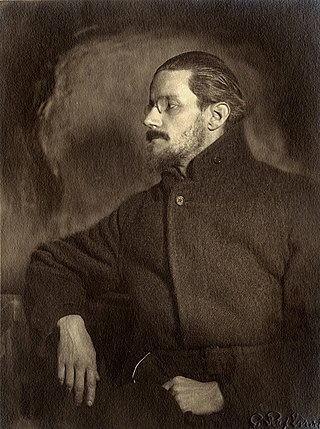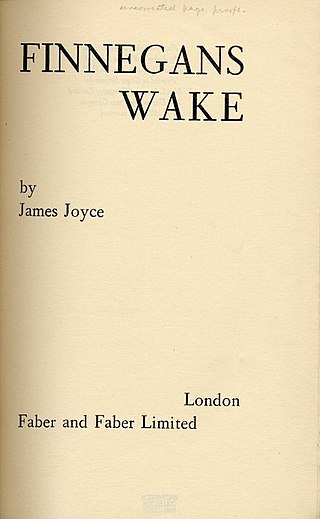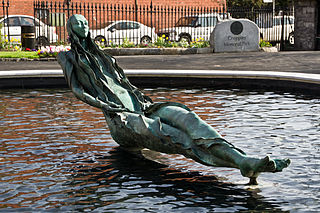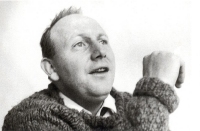Related Research Articles

James Augustine Aloysius Joyce was an Irish novelist, poet, and literary critic. He contributed to the modernist avant-garde movement and is regarded as one of the most influential and important writers of the 20th century. Joyce's novel Ulysses (1922) is a landmark in which the episodes of Homer's Odyssey are paralleled in a variety of literary styles, particularly stream of consciousness. Other well-known works are the short-story collection Dubliners (1914), and the novels A Portrait of the Artist as a Young Man (1916) and Finnegans Wake (1939). His other writings include three books of poetry, a play, letters, and occasional journalism.

Humpty Dumpty is a character in an English nursery rhyme, probably originally a riddle and one of the best known in the English-speaking world. He is typically portrayed as an anthropomorphic egg, though he is not explicitly described as such. The first recorded versions of the rhyme date from late eighteenth-century England and the tune from 1870 in James William Elliott's National Nursery Rhymes and Nursery Songs. Its origins are obscure, and several theories have been advanced to suggest original meanings.

Finnegans Wake is a novel by Irish writer James Joyce. It is well known for its experimental style and its reputation as one of the most difficult works of fiction in the Western canon. Written over a period of seventeen years and published in 1939, the novel was Joyce's final work. It is written in a largely idiosyncratic language which blends standard English with neologisms, portmanteau words, Irish mannerisms and puns in multiple languages to create a refracted effect. It has been categorized as "a work of fiction which combines a body of fables [...] with the work of analysis and deconstruction"; many critics believe the technique was Joyce's attempt to recreate the experience of dreams and hypnagogia, reproducing the way in which concepts, memories, people and places become amalgamated in dreaming. It has also been regarded as an attempt by Joyce to combine many of his prior aesthetic ideas, with references to other works and outside ideas woven into the text. Although critics have described it as unintelligible, Joyce declared that "every syllable can be justified". Due to its linguistic experiments, stream of consciousness writing style, literary allusions, free dream associations, and abandonment of narrative conventions, Finnegans Wake has been agreed to be a work largely unread by the general public.
"Finnegan's Wake" is an Irish-American comic ballad, first published in New York in 1864. Various 19th-century variety theatre performers, including Dan Bryant of Bryant's Minstrels, claimed authorship but a definitive account of the song's origin has not been established. An earlier popular song, John Brougham's "A Fine Ould Irish Gintleman," also included a verse in which an apparently dead alcoholic was revived by the power of whiskey.

Dubliners is a collection of fifteen short stories by James Joyce, first published in 1914. It presents a naturalistic depiction of Irish middle class life in and around Dublin in the early years of the 20th century.

The Dubliners were an Irish folk band founded in Dublin in 1962 as The Ronnie Drew Ballad Group, named after its founding member; they subsequently renamed themselves The Dubliners. The line-up saw many changes in personnel over their fifty-year career, but the group's success was centred on lead singers Luke Kelly and Ronnie Drew. The band garnered international success with their lively Irish folk songs, traditional street ballads and instrumentals. The band were regulars on the folk scenes in both Dublin and London in the early 1960s, and were signed to the Major Minor label in 1965 after backing from Dominic Behan who was paid by Major-Minor to work with the Dubliners and help them to build a better act fit for larger concert hall venues. The Dubliners worked with Behan regularly between 1965 and 1966; Behan wrote numerous songs for this act including the song McAlpine's Fusiliers created specifically to showcase Ronnie Drew's gravel voice. They went on to receive extensive airplay on Radio Caroline which was part-owned by Phil Solomon CEO of Major Minor, and eventually appeared on Top of the Pops in 1967 with hits "Seven Drunken Nights" and "The Black Velvet Band". Often performing political songs considered controversial at the time, they drew criticism from some folk purists and Ireland's national broadcaster RTÉ had placed an unofficial ban on their music from 1967 to 1971. During this time the band's popularity began to spread across mainland Europe and they appeared on The Ed Sullivan Show in the United States. The group's success remained steady right through the 1970s and a number of collaborations with The Pogues in 1987 saw them enter the UK Singles Chart on another two occasions.

William Percy French was an Irish songwriter, author, poet, entertainer and painter.

Coddle is an Irish dish which is often made to use up leftovers. It most commonly consists of layers of roughly sliced pork sausages and rashers with chunky potatoes, sliced onion, salt, pepper, and herbs. Traditionally, it can also include barley.

Luke Kelly was an Irish singer, folk musician and actor from Dublin, Ireland. Born into a working-class household in Dublin city, Kelly moved to England in his late teens and by his early 20s had become involved in a folk music revival. Returning to Dublin in the 1960s, he is noted as a founding member of the band The Dubliners in 1962. Known for his distinctive singing style, and sometimes political messages, the Irish Post and other commentators have regarded Kelly as one of Ireland's greatest folk singers.
"The Dead" is the final short story in the 1914 collection Dubliners by James Joyce. It is by far the longest story in the collection and, at 15,952 words, is almost long enough to be described as a novella. The story deals with themes of love and loss, as well as raising questions about the nature of the Irish identity.

Anna Livia is a bronze monument located in Croppies' Acre Memorial Park in Dublin, Ireland. It was formerly located on O'Connell Street.

Frank Harte was a traditional Irish singer, song collector, architect and lecturer. He was born in Chapelizod, County Dublin, and raised in Dublin. His father, Peter Harte, who had moved from a farming background in Sligo, owned 'The Tap' pub in Chapelizod.

Finnegan Wakes is a live album by The Dubliners. Recorded at the Gate Theatre on 26 and 27 April 1966 and produced by Nathan Joseph, this was The Dubliners' final recording for Transatlantic Records. But it was also their first to feature their first established line-up of Ronnie Drew, Barney McKenna, Luke Kelly, Ciarán Bourke and John Sheahan. The album featured "Nelson's Farewell", a satirical song about the bombing and destruction of Nelson's Pillar in O'Connell Street, Dublin on 8 March 1966.
"The Night Before Larry Was Stretched" is an Irish execution ballad written in the Newgate cant.
"Come All You Warriors" is a ballad concerning the 1798 Rising. The narrative focuses on the predominant figure in the Wexford Rising, Father John Murphy of the parish of Boulavogue.
HCE may refer to:

Spirit of the Irish: Ultimate Collection is an album by The Dubliners which charted at No. 19 in the UK Album Charts in 2003.
References
- ↑ Weaver, Frank. "Finnegans Wake – Songs and Musical Allusions". James Joyce Music. Retrieved 17 September 2019.
- ↑ Fargnoli, A. Nicholas; Gillespie, Michael Patrick (1996). James Joyce A to Z: The Essential Reference to the Life and Work. Oxford University Press. ISBN 978-0-19-511029-6.
- ↑ "[minstrels] The Ballad of Persse O'Reilly -- James Joyce". cs.rice.edu. 18 May 2008. Archived from the original on 18 May 2008. Retrieved 17 September 2019.